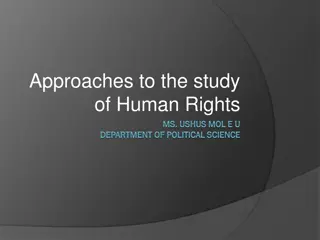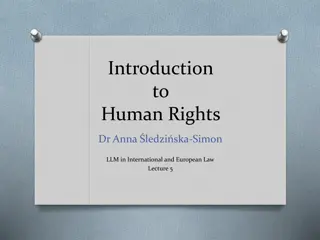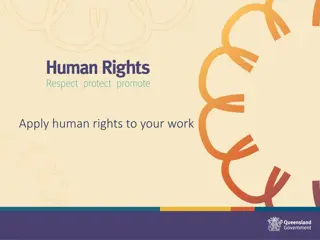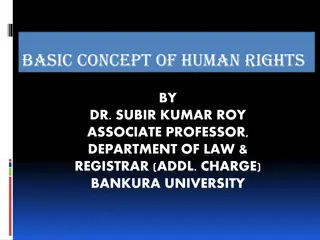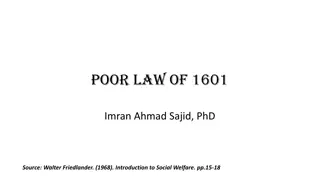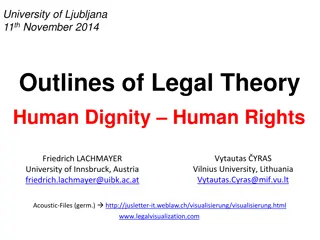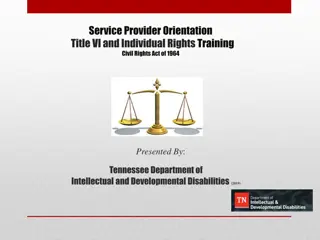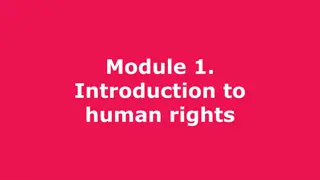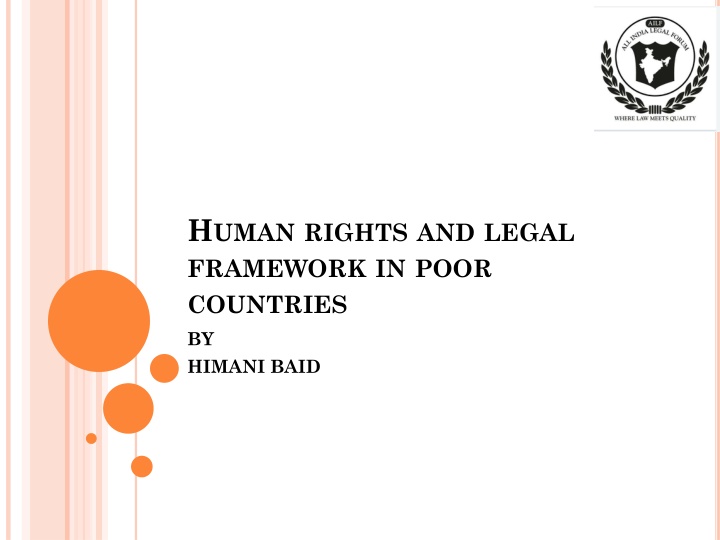
Human Rights and Legal Framework in Poor Countries
Human rights are a powerful idea that all individuals have inherent rights simply by virtue of being human. In poor countries, legal empowerment plays a crucial role in protecting and enabling marginalized populations to access justice and rights. This introduction highlights the critical intersection of human rights and legal frameworks in addressing inequalities and promoting social justice in disadvantaged communities.
Download Presentation

Please find below an Image/Link to download the presentation.
The content on the website is provided AS IS for your information and personal use only. It may not be sold, licensed, or shared on other websites without obtaining consent from the author. If you encounter any issues during the download, it is possible that the publisher has removed the file from their server.
You are allowed to download the files provided on this website for personal or commercial use, subject to the condition that they are used lawfully. All files are the property of their respective owners.
The content on the website is provided AS IS for your information and personal use only. It may not be sold, licensed, or shared on other websites without obtaining consent from the author.
E N D
Presentation Transcript
HUMAN RIGHTS AND LEGAL FRAMEWORK IN POOR COUNTRIES BY HIMANI BAID
WHAT ARE HUMAN RIGHTS? [DEFINITIONS ] Human rights are at one and the same time the simple and extraordinarily powerful idea that all people have rights simply because they are human and are an extensive and complex system of international laws and procedures. (Healy, 2009) All human beings are born free and equal in dignity and rights (UNDHR, 1948, article 1) Everyone is entitled to all the rights and freedoms set forth in this Declaration, without distinction of any kind, such as race, colour, sex, language, religion, political or other opinion, national or social origin, property, birth or other status. (UDHR, 1948, article 2)
WHAT ARE HUMAN RIGHTS? Human Beings are rational beings. They by virtue of their existence possess certain basic rights which are commonly known as human rights. Human Rights are defined as all those rights which are essential maintenance and protection of dignity of individuals and create conditions in which every human being can develop his personality to the fullest extent may be termed as human rights. Human rights become operative with the birth of an individual and are inherent in all the individuals irrespective of their caste, religion, sex and nationality. Human rights are also sometimes referred to as fundamental rights, basic rights, inherent rights, natural rights and birth rights.
WHAT ARE HUMAN RIGHTS? The World conference On Human Rights held in 1993 in Vienna stated in the Declaration that all human rights derive from the dignity and worth inherent in the human person , and that the human person is the central subject of human rights and fundamental rights.
INTRODUCTION In many poor countries laws, institutions, and policies governing economic and social interactions do not ptovide equal opportunity and protection to a large segment of the population, who are mostly poor, minorities, women and other disadvantaged groups Legal empowerment of the poor can be understood as the process of systemic change through which the poor are protected and enabled to use the law to advance their rights and their interests as citizens and economic actors.
INTRODUCTION Legal empowerment is rooted in a human rights based approach to development, which recognizes that poverty results from disempowerment, exclusion and discrimination. Legal empowerment of the poor seeks to establish the rule of law and ensure equal and equitable access to justice and tackle the root causes of exclusion, vulnerability and poverty.
THE INTERNATIONAL HUMAN RIGHTS FRAMEWORK Poverty is the profound human rights challenges in the world. All communities living in poverty is do not have access, on equal footing, to government institutions and services that protect and promote human rights which should such institutions exist in the first place. Legal empowerment is critical both as a development objective and as an outcome, whereby all individuals as rights-holders will possess capacities to claim and exercise their rights.
THE INTERNATIONAL HUMAN RIGHTS FRAMEWORK The international human rights framework offers a comprehensive basis for legal empowerment of the poor. The relevant international norms and standards that support legal empowerment of the poor are constantly being strengthened and elaborated,.
LEGAL EMPOWERMENT OF THE POOR: THE OPERATIONAL FRAMEWORK The human rights instruments, and the ongoing work and recommendations of the Human Rights Treaty Bodies provide the normative basis of the legal empowerment of the poor Access to justice : The legal system plays an important role eradicating poverty by giving poor people access to the appropriate mix of rights and remedies. Property rights : Article 17 of the UDHR recognizes property rights as a fundamental human right.the absence or insecurity of property rights remains a central cause of poverty ,especially in the very poorest countries
LEGAL EMPOWERMENT OF THE POOR: THE OPERATIONAL FRAMEWORK Labour rights : The ability to work is the greatest asset for the poor. Hence the legal empowerment of the poor seeks to make international and national systems of labour standards and labour rights more inclusive and promote more productive and decent work for poverty eradication.
LEGAL EMPOWERMENT OF THE POOR AND THE UNITED NATIONS Poverty eradication is the cardinal development objective of the United Nations. To gain a broader understanding of what is meant by legal empowerment, as well as obtain some examples of experiences with legal empowerment at the national and regional levels, the United Nations Secretariat requested input from various funds, programmers and agencies of the UN system. The ILO promotes the legal empowerment of the poor through a variety of standards-related activities like legislative gaps analyses, awareness-raising and advocacy, advice on legislative reform and capacity building addressed to governments, employers' and workers' organizations as well as judges and parliamentarians.
LEGAL EMPOWERMENT OF THE POOR AND THE UNITED NATIONS UNESCO stated that it is committed to a series of initiatives at national and regional levels to support empowerment of the poor and the eradication of poverty. UNESCO fosters community-based media to catalyze and amplify community voice" and promote public participation in people-centered development. The concept of legal empowerment of the poor is embedded in UNDP which calls for Equity, inclusiveness and the effective reduction of poverty, depend on the ability of institutions to deliver public goods and social services, effectively regulate markets in the public interest and provide legal access to economic assets and opportunities in ways that are fair and equitable.
CONCLUSION Legal empowerment must be firmly anchored in the realities of poverty and exclusion. It requires changes in the relations between the State and the poor. Legal empowerment of the poor is both a development strategy and development objective of powers. Basic human needs, understood as fundamental human entitlements, are not a matter of charity but of justice, and should therefore be embodied in clear, legally binding standards.

